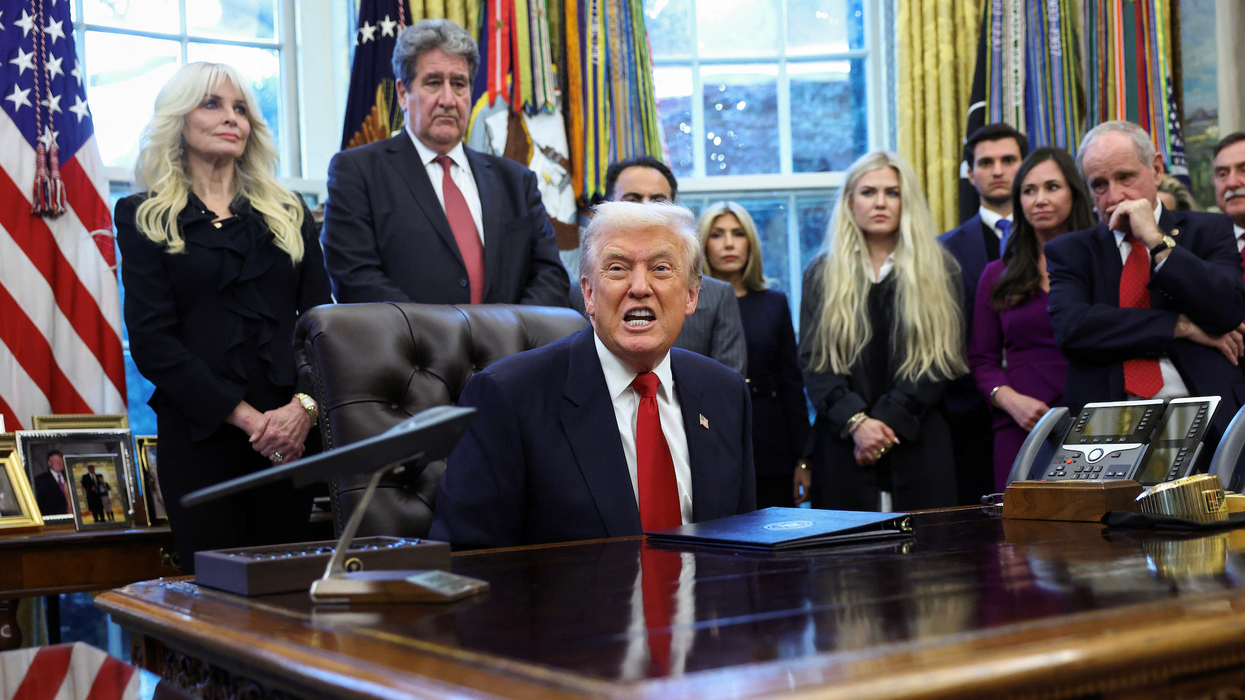A year into his second and final term in office, President Donald Trump isn't a traditional lame duck as he and his MAGA faithful are plotting to escalate attacks on democracy, writes Salon's Chauncey DeVega.
The Democratic wins on November 4, DeVega writes, "showed signs of political life" for the party that has been increasingly fractured — until " Sunday night, when eight Senate Democrats sacrificed some of that enthusiasm and momentum by making a deal with Republicans to end the government shutdown, for which they received nothing tangible in return."
Despite that, she says, the election gains made by Democrats leave Trump and MAGA Republicans scrambling to figure out how to fight back.
The good news for Democrats, she writes, is that "voters moved toward Democrats in nearly every state that held elections. 'Affordability' proved a winning message amid the dismal numbers of Trump’s economy."
"Data from DownBallot shows Democrats outperforming former Vice President Kamala Harris’ vote percentage in this year’s elections," she notes.
These Democratic wins are amidst a backdrop in which "Trumpism and MAGA are becoming an increasingly toxic brand. Exit polls show that on issues from the economy and inflation to mass deportations and attacks on democracy, more Americans are turning against Trump’s agenda," DeVega writes.
DeVega cites The American Prospect’s Harold Meyerson's analysis in which he says that Trump as president just isn't that popular.
"Data consistently shows that Donald Trump the candidate — the avatar of rage and the unfulfilled dreams of many Americans who are justifiably angry at 'the system' — is far more popular than President Trump, whose record in office is vindictive, unhinged and steeped in meanness," DeVega writes.
Democrats, however, DeVega says, need to get some perspective as the party's unpopularity is at record levels. In some polls, the party is still less trusted than Republicans on crime, the economy, and cultural issues.
While the November wins were big, there's a caveat, DeVega writes.
"The election was conclusively a referendum on the president’s extreme policies. But Trump himself was not on the ballot, and he remains a unique figure in American politics with a great amount of control over his many tens of millions of followers," DeVega explains.
"The Democratic Party’s defeat of the Republicans last Tuesday is part of the historic trend where the incumbent party usually loses off-year elections," he adds.
The "shutdown surrender" is a sign of Senate Democrats' "terminally bad habits," and while some see Trump as a lame duck, DeVega says that is a very "premature conclusion" that is "based on the obsolete assumption that America is a healthy democracy instead of one that is rapidly collapsing into a state of autocracy."
Trump and MAGA Republicans are unmoved by public opinion, instead "embracing policies — such as tariffs and allowing health care premiums to skyrocket — that most Americans reject," DeVega adds.
"If anything, after last week’s defeats at the polls, they are likely to escalate their attacks on American democracy because they have reasonably concluded that, with the 2026 midterms approaching, the window of maximum opportunity and leverage may be closing," he writes.
Trump's threats to use the Insurrection Act lead DeVega to conclude that "it’s not outside the realm of possibility that elections could be suspended."
The president's impending executive order to restrict mail-in voting and require voter IDs could "ensure that Democratic voters are not able to exercise their constitutionally guaranteed rights" DeVega writes, and also points to what elections attorney Marc Elias ominously predicted as "dark times ahead."
"Increasingly, it appears that the administration’s ultimate goal is, just like in Vladimir Putin’s Russia and Viktor Orbán’s Hungary, to de facto outlaw the Democratic Party and any other opposition movement," DeVega writes.
"Under that scenario, the United States would be ruled by a system of competitive authoritarianism. Elections would take place, but the outcome would be rigged in favor of Trumpists," he adds.
DeVega says that Trump is so dangerous that this could be the best of the worst outcome, the worst being "that the veneer of a fake democracy could even be replaced with a full-on authoritarian regime."
However, last Tuesday's elections proved that there is still time to thwart these authoritarian ambitions, DeVega notes.
"But on Nov. 4, pro-democracy Americans saw hope turn into tangible victory. Trump and MAGA are not forever. The elections proved that American democracy can still fight back. The question is whether it can survive its next battle" he adds.


